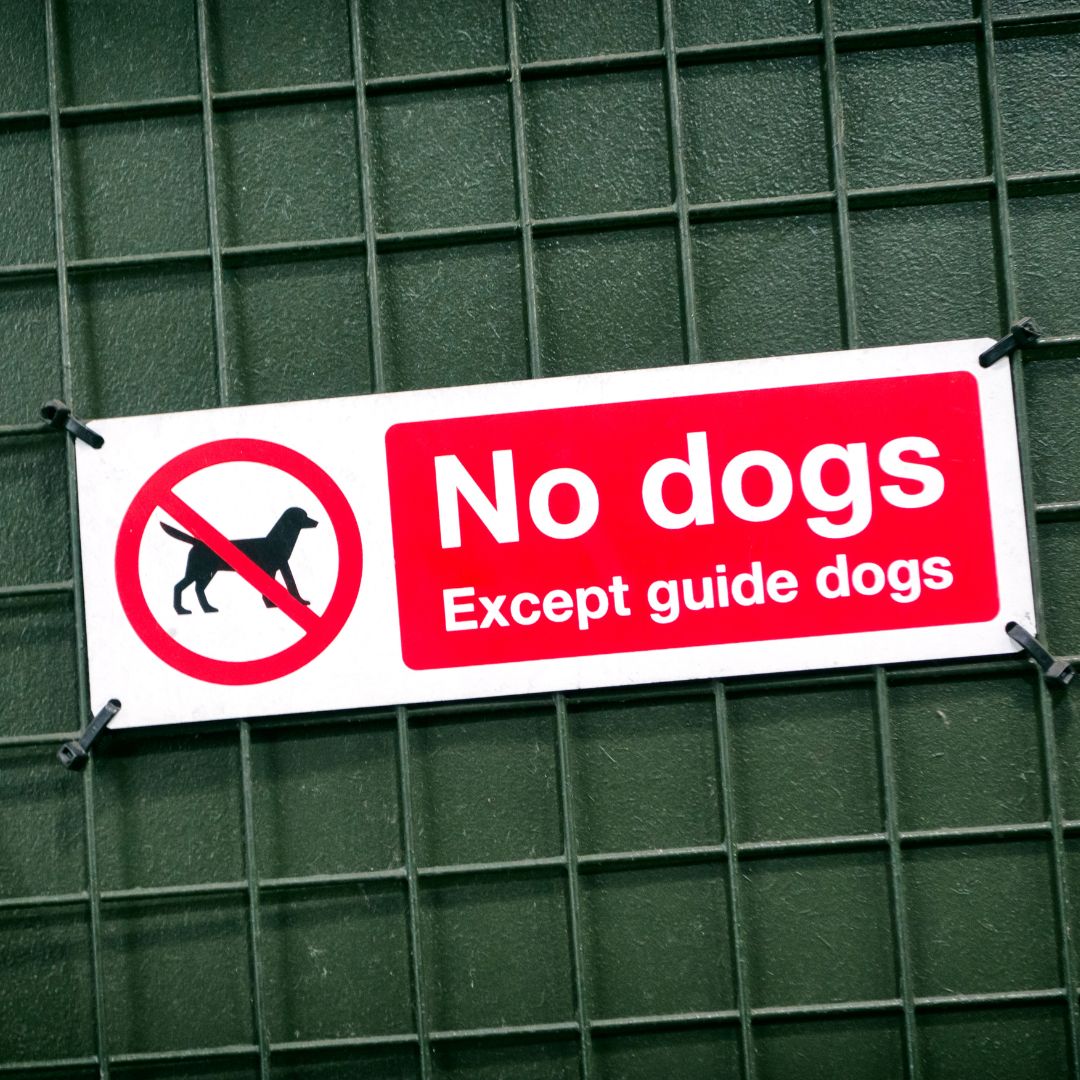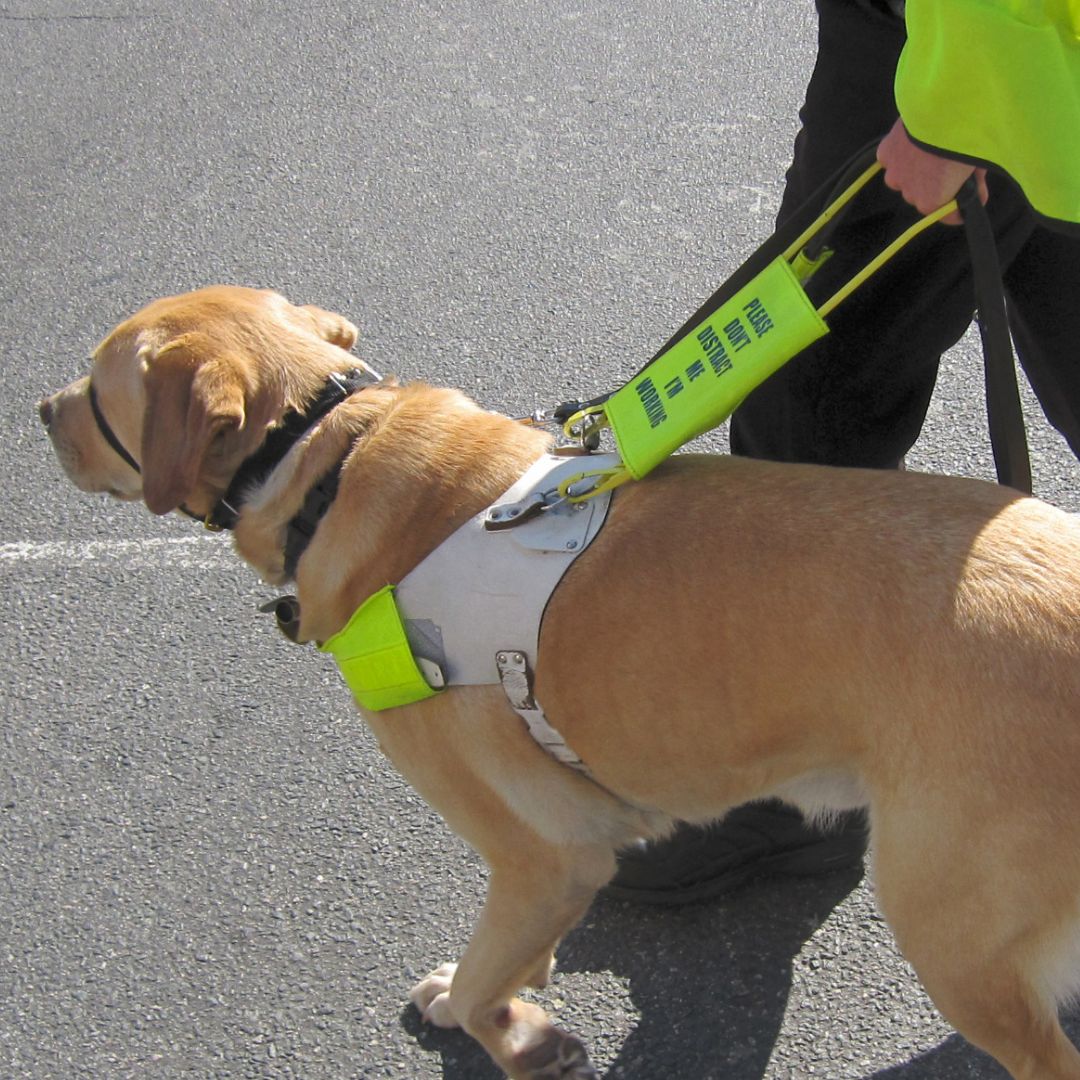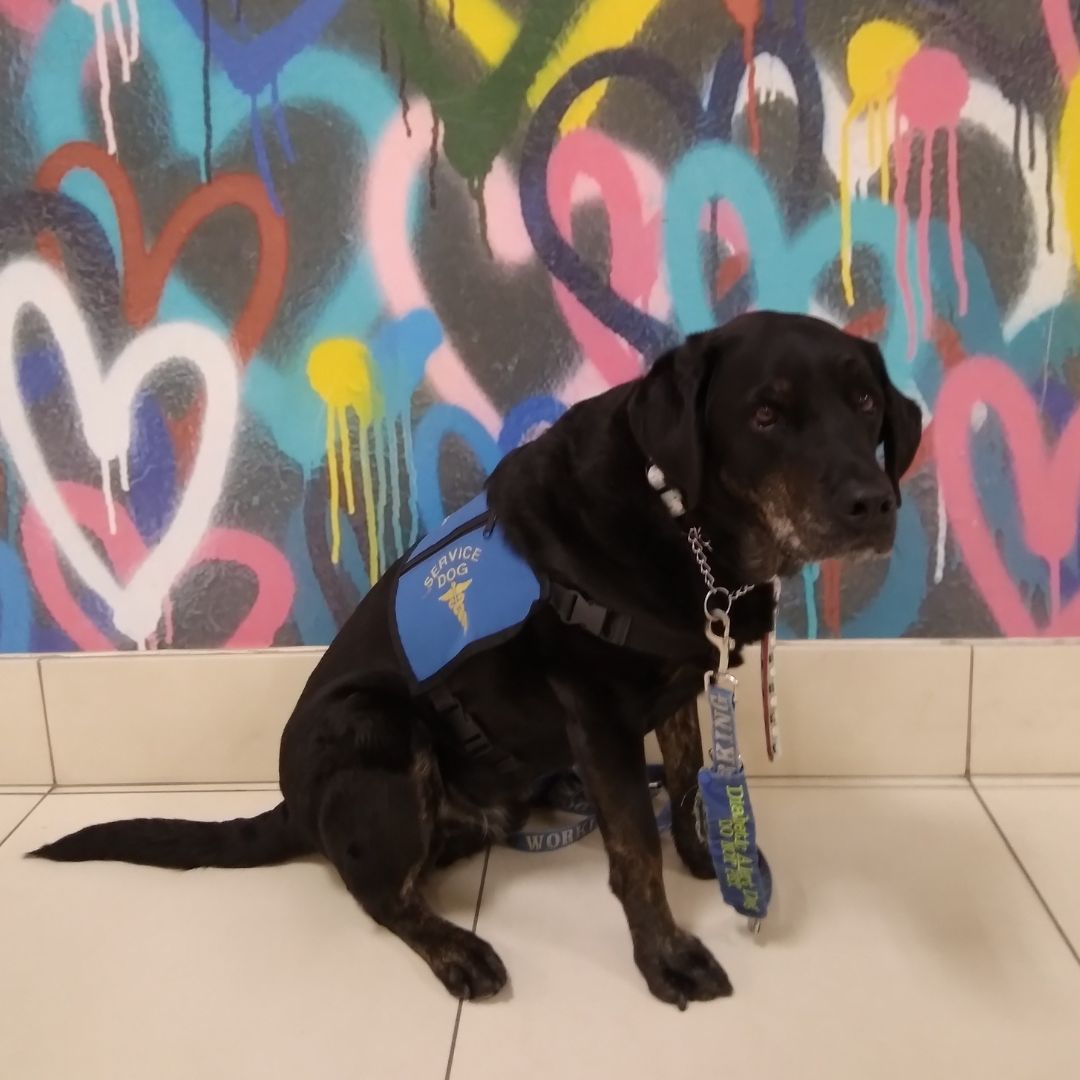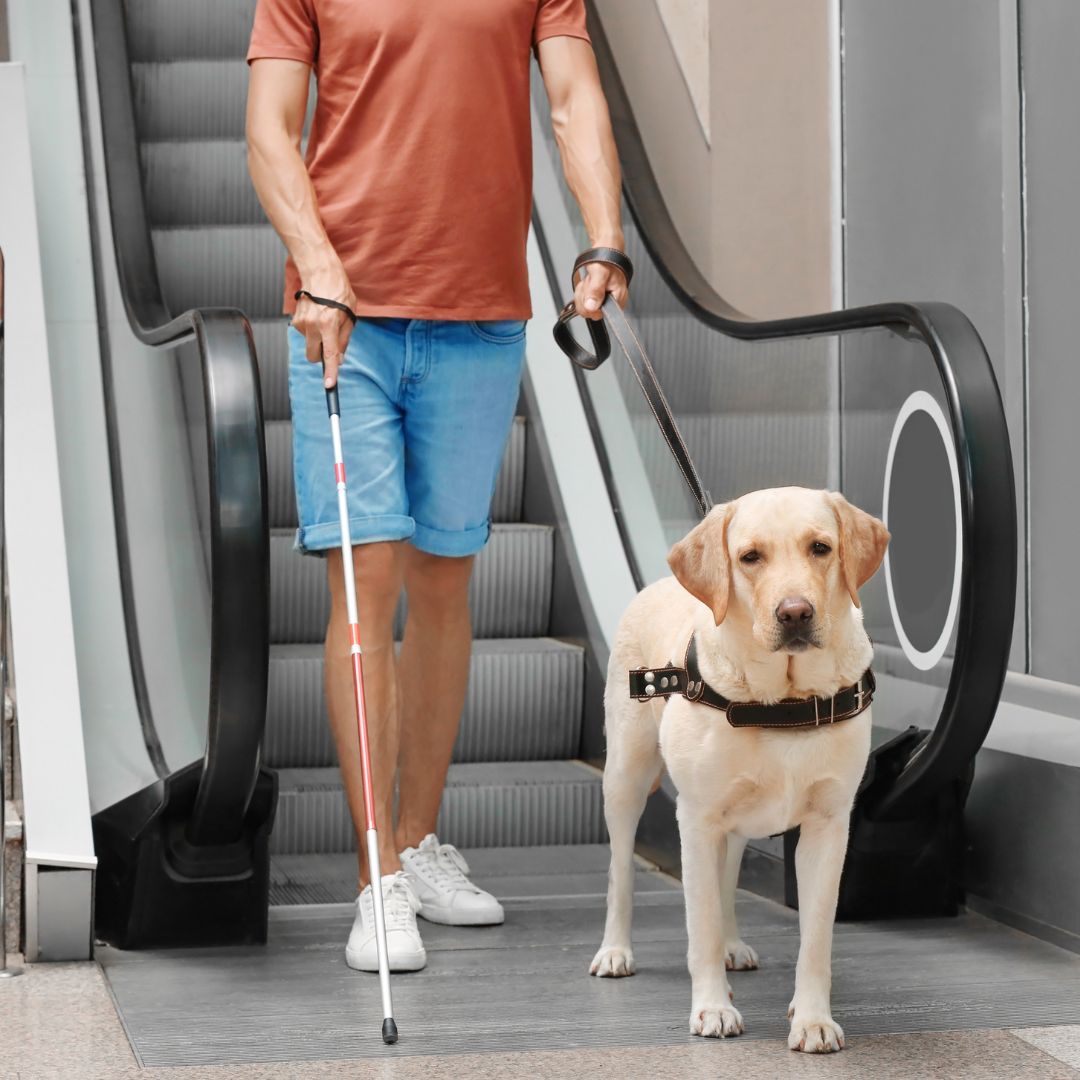Service dogs are much more than just beloved pets. These superheroes in fur are specially trained to perform tasks that directly assist people with specific needs, significantly enhancing their quality of life and empowering them to navigate the world with confidence.
5 Types of Service Dogs
Within the world of service dogs lies a diverse range of specializations, each catering to unique needs.
1. Guide Dogs:
These dogs provide safe navigation for individuals with visual impairments, guiding them around obstacles and helping them navigate unfamiliar environments.
Breeds like Labrador Retrievers, German Shepherds, and Golden Retrievers are commonly used for their intelligence, focus, and loyalty.
2. Mobility Assistance Dogs:
For individuals with mobility limitations, these dogs can retrieve items, open doors, pull wheelchairs, and even provide stability during balance challenges.

Breeds like Labrador Retrievers, Great Danes, and Standard Poodles excel in these roles due to their strength and trainability.
3. Hearing Dogs:
These alert partners act as auditory extensions for individuals with hearing loss. They signal sounds like smoke alarms, fire alarms, telephones ringing, and doorbells, providing crucial safety and independence.
Breeds like Australian Shepherds, Border Collies, and Bull Terriers are often chosen for their alertness and focus.
4. Medical Alert Dogs:
Trained to detect specific medical conditions, these dogs can be lifesavers for individuals with diabetes, epilepsy, or allergies.
- Diabetic alert dogs detect changes in blood sugar levels, prompting their handler to take necessary action.
- Seizure response dogs sense the onset of seizures and help their companion safely lie down, retrieve medication, or alert others.
- Allergen detection dogs can smell the slightest traces of potential allergens in the air or within food and alert their handlers to allergen exposure, allowing them to take necessary precautions.
Breeds like Labrador Retrievers, Golden Retrievers, and Poodles are typically used due to their attentiveness and ability to learn complex tasks.
5. Psychiatric Service Dogs (PSDs):
These calming dogs offer emotional support and assistance for individuals with mental health conditions like anxiety, PTSD, or depression. They can help mitigate anxiety attacks, flashbacks, or depressive episodes. They might offer tactile stimulation, help manage panic attacks, interrupt self-harming behaviors, or remind their partner to take medication.
Breeds like Labrador Retrievers, Golden Retrievers, and Poodles are well-suited due to their calm and empathetic nature.
Beyond Breeds
Certain breeds like Labrador Retrievers and Golden Retrievers are commonly associated with service work. These people-pleasing breeds are food-motivated, so they are easily trained, because treats help keep them focused on their handler.
However, any dog with the temperament and aptitude can be trained. Ultimately, their individual skills and willingness to work matter most.
Imposters Create Problems for True Service Dogs
Dogs wearing all kinds of vests are seemingly everywhere, making it difficult to identify authentic service dogs.
In addition, the rise of emotional support animals (ESAs) and the misconception that any well-behaved dog can be a service dog has led to confusion and even exploitation.
Christy Hoss, handler for a diabetic alert service dog, says, “Pet owners who pass their pets off as service dogs are selfishly harming those of us whose lives depend upon a working dog.”
Because so many people buy a “service dog” vest online and use that as an excuse to take their dog everywhere, Hoss sometimes encounters businesses that frown on her and her service dog. Recently, she visited a workout center and the check-in clerk told her, “Ma’am, you can’t have that dog in here.”
Her service dog was “on his harness, on duty, not barking, not pooping, and well-behaved.”
Hoss’s response to the clerk: “Yes, I can bring my dog in here, and what you told me is illegal.”
Businesses that have a “no dogs” policy can’t legally turn away a service dog and its handler. The story had a happy ending – it inspired the facility to train their employees on how to recognize a service dog.

5 Ways to Differentiate Service Dogs from Imposters
So, how can you distinguish a true service dog from an imposter? Here are 5 key indicators:
1. Task-Oriented:
A genuine service dog is always working. They maintain sustained focus on their handler, anticipating and responding to cues and performing their assigned tasks with attentiveness. They resist food temptations and politely decline playful advances from strangers.

2. Calm, Focused Demeanor:
Service dogs undergo rigorous training to avoid interacting with strangers or other animals, focusing solely on their handler’s needs. They maintain exceptional composure in public settings and in other highly stimulating environments. They rarely bark, lunge at people, or exhibit anxious or destructive behaviors.
3. Specialized Gear:
Service dogs almost always wear a well-fitting harness, tether, vest, or jacket. While not mandatory everywhere, some service dogs wear official tags or patches that clearly identify their working status and the type of disability they assist with. Their handler may also carry the service dog’s certification from a reputable training organization.
4. No “Emotional Support” Labels:
Legitimate service dogs won’t wear vests labeled “emotional support” or “therapy animal,” as these designations do not hold the same legal protections. Unlike service dogs, who accompany their handler everywhere, emotional support dogs are usually used in private settings.
5. Public Access Rights:
Service dogs are legally allowed to accompany their handlers in public spaces where pets are typically banned, such as hospitals (except for sterile surgical environments), clinics, school classrooms, college dorms, homeless shelters, hotels, airplane cabins, and shops.
They are allowed in establishments that prepare and sell food, although they are not permitted in the part of a restaurant where food is being prepared.
Businesses cannot deny entry based solely on the presence of a service dog (see the next section for more information).
Respect the Partnership
Service dogs are not pets. They are dedicated partners performing essential tasks for their handlers.
Here are some etiquette tips to help you interact with a service dog team:
If you encounter a team in public, maintain a respectful distance. Offer a friendly smile or nod, and avoid petting or engaging without permission.
Service dog handlers often appreciate genuine inquiries about their dog’s role, but may choose not to talk about their disability or their dog’s training beyond providing basic information. They may decline requests for photos.
Avoid unintentional discrimination by familiarizing yourself with the Americans with Disabilities Act (ADA) regarding the public access rights of service animals.
It is not legal for staff in a public place to “ask about the person’s disability, require medical documentation, require a special identification card or training documentation for the dog, or ask that the dog demonstrate its ability to perform the work or task.” (ADA.gov)
Legitimate service dog programs do not issue identification cards or vests. Requesting such documents is against the law, unnecessary, and discriminatory.
By respecting these boundaries, you help create a more welcoming world for individuals who depend on the unwavering loyalty and invaluable service of their furry companions.
Note: This article provides information and should not be construed as legal advice. For specific legal questions or concerns, consult with an attorney specializing in disability law.
Additional Resources
It’s important to educate yourself and others about the vital role service dogs play, fostering understanding and respect for these incredible animals and their handlers.
For more information about The Americans with Disabilities Act and to speak with an ADA Specialist, call the ADA Information Line 800-514-0301 (Voice) and 1-833-610-1264 (TTY)
Hours:
M-W, F 9:30 a.m.-12:00 p.m. and 3:00-5:30 p.m. (Eastern Time)
Th 2:30-5:30 p.m. (Eastern Time). Calls are confidential.




